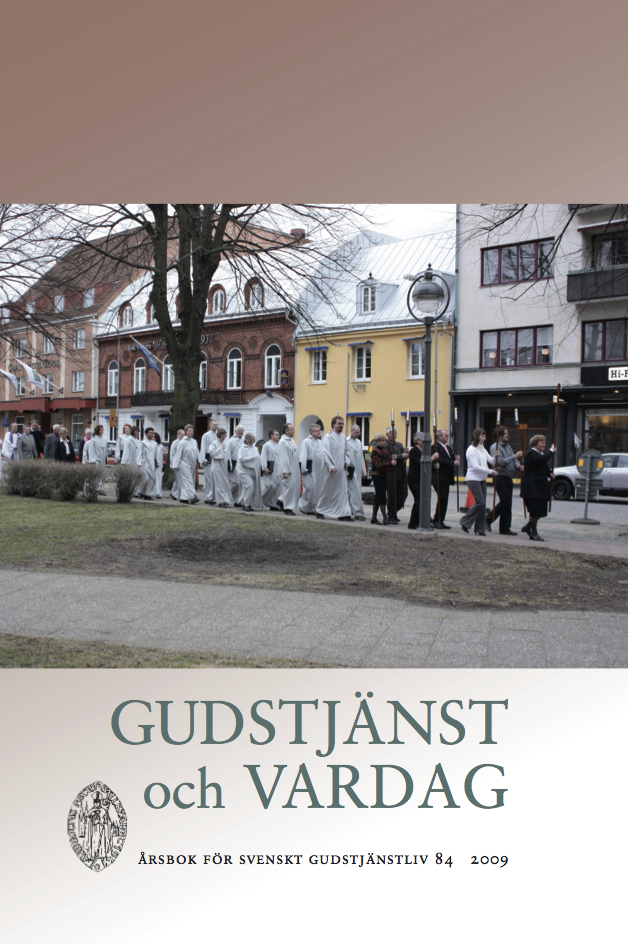Från plikten till hjärtat. Förändringar i vardagens gudstjänster
Abstract
From Duty to Heart: Changes in Everyday Worship
This article takes its point of departure in a research project (»Enköpingsstudien») on religion in a midsized Swedish town: Enköping. The study showed that for most people religion as prayer, worship, faith, or reading of sacred scriptures is marginal in their everyday life. Duties connected with work, citizenship and social life are considered to be stressful. »Spirituality», a term rarely used, is thought of as a break from such duties. Given this background, what forms of everyday/weekday worship are feasible? A Lutheran understanding of weekday worship is that it consists of service for the neighbour. A problem with this view is that the caring professions report high incidence of stress related illnesses. An emphasis of worship as service would be yet another demand on people who are already vulnerable to stress. Some suggestions are then given. As it is important that worship does not become yet another stress factor the possibility for the individual to choose when and where to worship was seen as pivotal. In order to do this the parish might provide mp3 files with a simple form of worship focusing on inner peace, maybe in the form of a guided meditation, music, a hymn from the new Swedish experimental hymnal Psalmer i 2000-talet, and a blessing.
This form of worship is then placed in the larger framework of research done by Paul Heelas and Linda Woodhead: The Spiritual Revolution: Why Religion is Giving Way to Spirituality and their observation that there is a cultural turn from »life-as» to »subjective life». »Life-as» is then characterised by the motto »Duty above all» and »subjective life» by »Listen to your heart». The churches have until now largely promoted »life-as», whereas many people in late modern societies favour subjective lives. These ways of life are applied to hymns found in Swedish hymnals. Two analytical concepts are introduced: affirmative spirituality and transformative spirituality. Older hymns emphasise transformative spirituality: the soul should ideally be transformed from a state of sin to a state of redemption. External changes in life are few and the emphasis is on inner transformation. In late modern society external changes are rapid and inner transformation would then be perceived as yet another instance of stress. Many of the hymns in Psalmer i 2000-talet articulate an affirmative spirituality: »God breathes within me» and affirms the unique and precious self. The hymns tend to emphasise God’s immanence, the Spirit is important, but Christology becomes problematic. The name Jesus is often circumscribed as »the Living One», »the Liberator» or »God with us».Everyday is constantly changing: do the new hymns reflect changes in society? As seen, they do reflect the subjective turn. Other important changes such as changing gender relations and an aging population are addressed to a lesser extent. Finally the question of religious diversity in the hymns is discussed. Four ways of addressing religious diversity in hymns are suggested: a) hymns written for a Christian community but possible to use also in other religious traditions; b) hymns written in a non-religious context but found to have spiritual dimensions that people from different faiths recognise; c) hymns written in a religious tradition other than the Christian but used by Christians; d) hymns explicitly addressing a multi-religious context. Hymns from categories a) – c) can be found in Swedish hymnals. The fourth category is not represented and the need for such hymns was questioned. They tend to fixate religious belonging to narrow and mutually excluding categories (»Christian», »Muslim», »Buddhist» etc.) while religious identity in late modern society is much more fluid.
Key words: Enköpingsstudien, hymns, spirituality, subjective life, life-as
Downloads
Publicerad
Nummer
Sektion
Licens
© författarna, Laurentius Petri Sällskapet för svenskt gudstjänstliv samt Artos & Norma bokförlag. Det är tillåtet att kopiera och använda material ur Svenskt Gudstjänstliv för forskningsändamål om källan anges. För övriga ändamål kontakta respektive artikelförfattare samt förlaget. Särskilda restriktioner kan gälla för bildmaterial.


